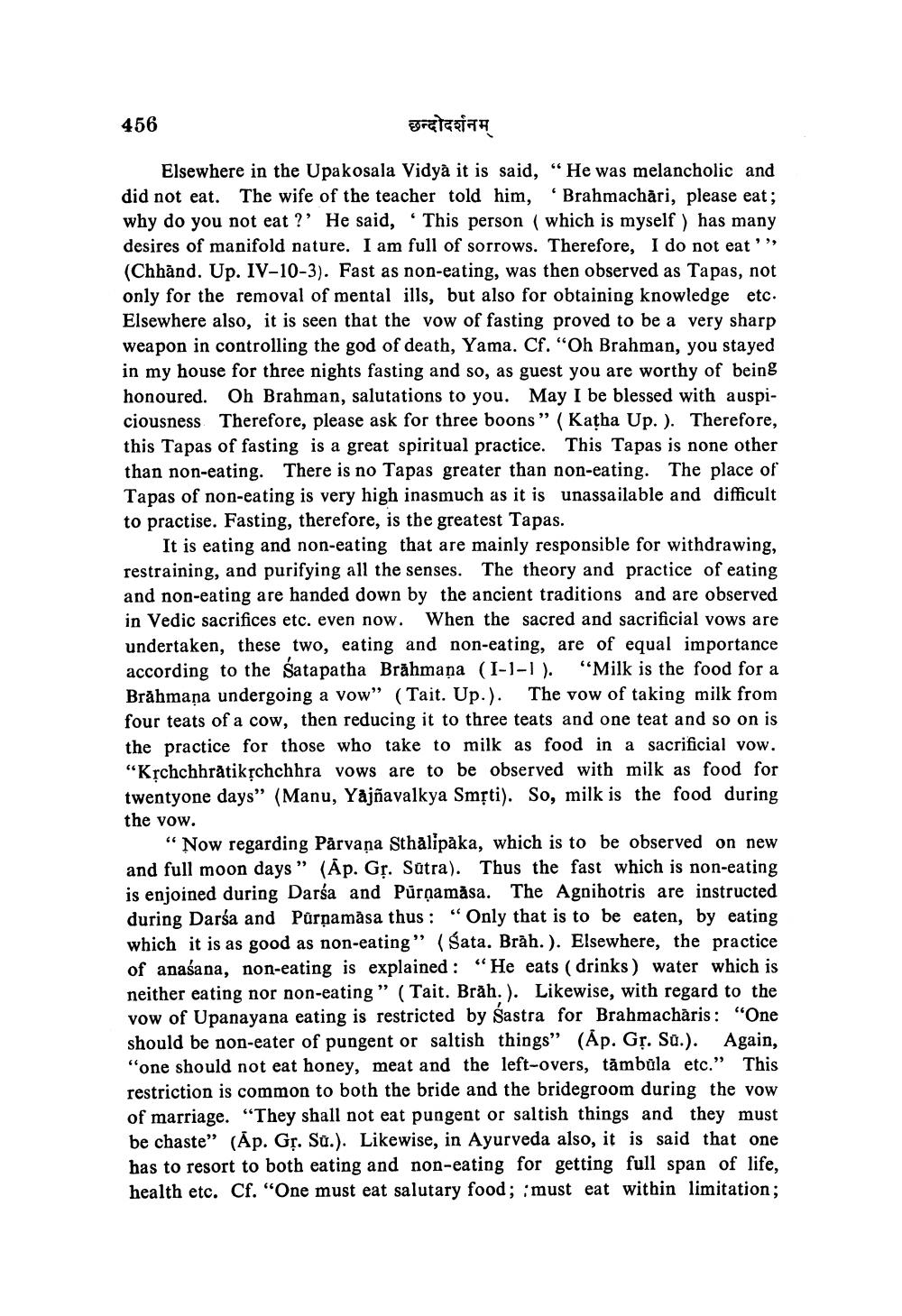________________
456
छन्दोदर्शनम
Elsewhere in the Upakosala Vidyà it is said, "He was melancholic and did not eat. The wife of the teacher told him, 'Brahmachäri, please eat; why do you not eat ?' He said, “This person ( which is myself ) has many desires of manifold nature. I am full of sorrows. Therefore, I do not eat'” (Chhand. Up. IV-10-3). Fast as non-eating, was then observed as Tapas, not only for the removal of mental ills, but also for obtaining knowledge etc. Elsewhere also, it is seen that the vow of fasting proved to be a very sharp weapon in controlling the god of death, Yama. Cf. "Oh Brahman, you stayed in my house for three nights fasting and so, as guest you are worthy of being honoured. Oh Brahman, salutations to you. May I be blessed with auspiciousness Therefore, please ask for three boons" (Katha Up.). Therefore, this Tapas of fasting is a great spiritual practice. This Tapas is none other than non-eating. There is no Tapas greater than non-eating. The place of Tapas of non-eating is very high inasmuch as it is unassailable and difficult to practise. Fasting, therefore, is the greatest Tapas.
It is eating and non-eating that are mainly responsible for withdrawing, restraining, and purifying all the senses. The theory and practice of eating and non-eating are handed down by the ancient traditions and are observed in Vedic sacrifices etc. even now. When the sacred and sacrificial vows are undertaken, these two, eating and non-eating, are of equal importance according to the Satapatha Brāhmaṇa (1-1-1). "Milk is the food for a Brāhmaṇa undergoing a vow” (Tait. Up.). The vow of taking milk from four teats of a cow, then reducing it to three teats and one teat and so on is the practice for those who take to milk as food in a sacrificial vow. “Krchchhràtikschchhra vows are to be observed with milk as food for twentyone days” (Manu, Yåjñavalkya Smộti). So, milk is the food during the vow.
"Now regarding Parvana Sthalipaka, which is to be observed on new and full moon days” (Āp. Gr. Sūtra). Thus the fast which is non-eating is enjoined during Darsa and Purgamasa. The Agnihotris are instructed during Darśa and Púrpamāsa thus: “Only that is to be eaten, by eating which it is as good as non-eating" (Sata. Bräh.). Elsewhere, the practice of anaśana, non-eating is explained : “He eats ( drinks) water which is neither eating nor non-eating ” (Tait. Brāh.). Likewise, with regard to the vow of Upanayana eating is restricted by Sastra for Brahmacharis: "One should be non-eater of pungent or saltish things” (Ap. Gr. Su.). Again, "one should not eat honey, meat and the left-overs, tāmbūla etc.” This restriction is common to both the bride and the bridegroom during the vow of marriage. “They shall not eat pungent or saltish things and they must be chaste” (Ap. Gr. Sü.). Likewise, in Ayurveda also, it is said that one has to resort to both eating and non-eating for getting full span of life, health etc. Cf. "One must eat salutary food; :must eat within limitation;




